Consider how much wisdom and insight you would gain if you understood the book of Genesis better. Its message about God, sin, people, and redemption is inspired (2 Tim. 3:16-17) and can transform your life (Rom. 12:2). It also points to Jesus Christ. Bible commentaries on Genesis can help you understand and apply its message.
The Bible instructs Christians to seek wisdom (Prov. 1:7; James 1:5), and who better to learn from than pastors, theologians, and professors who have been studying and teaching Genesis for decades?
10 Best Genesis Commentaries
The best Matthew commentaries are listed below. The recommendations include commentaries for every reading level and purpose, including individual Bible study, small groups, Sunday school, preaching, and teaching. The “Top 10” list is based on aggregate reviews.
Readers are encouraged not to use commentaries to replace prayer, the Holy Spirit, and the individual’s diligent study of Scripture. Nevertheless, a list based on aggregate reviews will likely point you in the right direction to find the right resource for your purposes.
Please use the list below as a starting point for learning about commentaries on Matthew. It’s not intended as the “final word” on the topic but merely a “helpful word.”
#1: Genesis (2 vol.) by Gordon J. Wenham (WBC)
Gordon J. Wenham is an eminent biblical scholar known for his expertise in the Old Testament. He has made significant contributions to the field of biblical studies through his research, writing, and teaching. He is particularly renowned for his work on the book of Genesis.
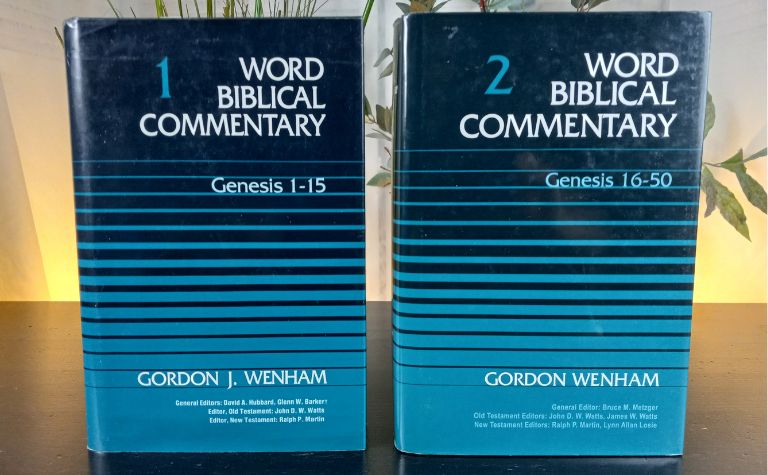
A masterful treatment of the first book of the Bible
According to Desiring God and Ligonier ministries, Wenham’s Genesis volumes are ranked #1. Old Testament scholar Tremper Longman called Wenham “one of the finest evangelical commentators today.” Bible scholar John Walton says it’s a “sound presentation of modern evangelical interpretation.”
Volume: Based on aggregate reviews, Wenham’s Genesis commentary ranks slightly higher than Hamilton’s and Mathews’ volumes (see below). Some people find Word Biblical Commentaries challenging to navigate because of their layout. Yet, most reviewers agree that Wenham’s volume is worth a reader’s time and effort because of his insights into Genesis.
Series: The WBC series is one of the best commentary series available today. It’s designed for pastors, teachers, and students of the Bible. It’s a mid-level commentary series, which means it’s more advanced than introductory commentaries, but you don’t have to know Hebrew to benefit from it.
Writing ministry: Wenham also wrote the Leviticus volume in the New International Commentary on the Old Testament series. Considering one of the best Leviticus commentaries, it explores the intricate rituals, laws, and themes of the third book of the Bible.
Also, please see Best Bible Commentaries Series: Top 50. Based on aggregate reviews.
#2: Genesis (2 vol.) by Victor P. Hamilton (NICOT)
Victor P. Hamilton is a prominent Bible scholar known for his expertise in the Old Testament. His research, writing, and teaching ministries have significantly contributed to biblical studies. Hamilton’s work focuses on the books of Genesis, Exodus, and various prophets in the Old Testament.
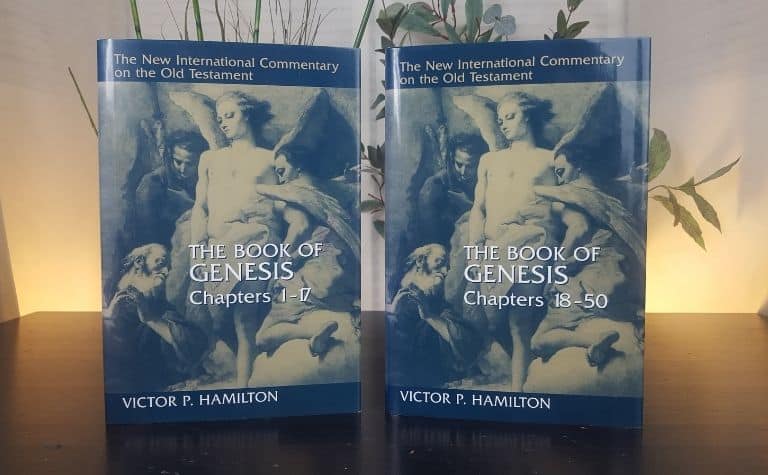
An accessible mid-level commentary for pastors
Reviewers note that Hamilton generally comes to conservative conclusions as he comments on Genesis. Like other commentaries, like Wenham’s (see above), readers may not agree with everything they read. Still, Hamilton’s reflections will teach and edify those studying Genesis for personal or ministry purposes.
Comparison: One of the benefits of Hamilton’s Genesis commentary is that it belongs to the well-reviewed New International Commentary on the Old Testament series. Some readers prefer Hamilton to Wenham because it’s easier for them to find the information they seek.
True to the series, Hamilton’s volumes combine exegesis and theology, which pastors will find especially helpful. Teachers may prefer Wenham. Laypeople may prefer Hamilton.
Series: The NICOT series is widely recognized for its high academic standards, rigorous scholarship, and commitment to providing in-depth analysis. Each volume provides a comprehensive commentary that explores the historical, literary, linguistic, and theological aspects of Scripture.
Writing ministry: Hamilton also wrote the “Dictionary of the Old Testament: Pentateuch” (co-edited with T. Desmond Alexander). This reference work provides in-depth articles on various topics related to the Pentateuch (or Torah), including authorship, composition, literary genres, and theological themes.
Also, see the Best One-Volume Bible Commentaries based on aggregate reviews.
#3: Genesis (2 vol.) by Kenneth A. Mathews (NAC)
Kenneth A. Mathews’ scholarship has greatly contributed to understanding the Old Testament, particularly the books of Genesis, Leviticus, and Joshua. His works reflect expertise in biblical studies, historical context, and theological interpretation.
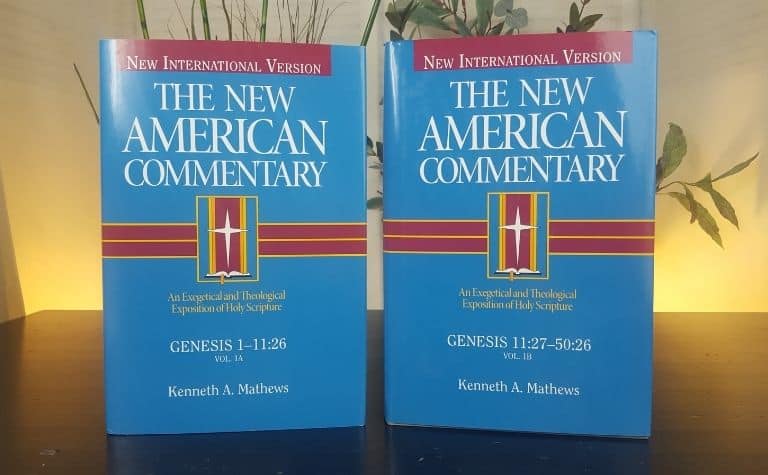
Expert-level literary and theological analysis of Genesis
Mathew’s Genesis volumes in the NAC series are well-reviewed for their accessibility (i.e., it’s easier to read than Wenham and Hamilton). Evangelical academic reviewers praise Mathews’ conclusions. Some scholars say it may be the best volume in the NAC series.
Comparison: Many people find Mathews’ commentary easier to read than Wenham’s and Hamilton’s (see above). Wenham contains more exegesis and interaction with Hebrew. Yet, Mathews offers more insight into the literature, theology, and historical issues than the other volumes. Many pastors favor Mathews.
Series: The New American Commentary series is widely regarded as a valuable resource for biblical studies, particularly for pastors, scholars, and students who seek in-depth analysis and understanding of the biblical text. The series broadly reflects evangelical and Baptist convictions.
Writing ministry: Mathew wrote the well-reviewed Leviticus volume in the Preaching the Word series, which is a collection of expository commentaries that provide practical application and preaching insights for pastors and Bible teachers. He also wrote the Joshua volume in the Teach the Text series.
#4: Genesis by John H. Walton (NIVAC)
John H. Walton is a distinguished biblical scholar known for his expertise in the Old Testament and ancient Near Eastern studies. He has authored several influential books and scholarly works that have profoundly impacted biblical scholarship.
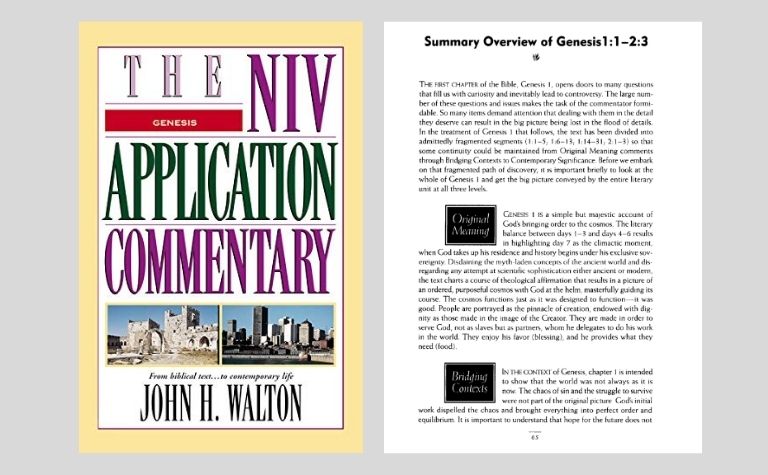
The best Genesis commentary for application
Mathison says Walton “excels in terms of bridging the gap between the original audience and the contemporary world.” Longman praises the volume for being well-written and criticizes it for not sufficiently explaining how Genesis relates to the New Testament.
Comparison: Walton’s one-volume Genesis commentary in the NIV Application Commentary series is the best choice for readers who want to understand and apply the text to life today. Walton’s is the easiest to read compared to Wenham, Hamilton, and Mathews (see above). It’s also the most affordable.
Series: The NIVAC series is designed for pastors, but most experienced Sunday school teachers and small group leaders will find it helpful. It may be the most popular Bible commentary series today. Its approach to explaining and making the text relevant today has garnered many devoted readers.
Writing ministry: Walton edited the well-reviewed “The IVP Bible Background Commentary: Old Testament,” which provides valuable historical and cultural context for understanding the Old Testament. It helps readers grasp the significance of the text within its original cultural and historical setting.
#5: Creation & Blessing by Allen P. Ross (Stand Alone)
Allen P. Ross is a notable biblical scholar known for his expertise in the Old Testament and Hebrew language. He has focused mainly on the books of Genesis, Leviticus, Psalms, and the Prophets.
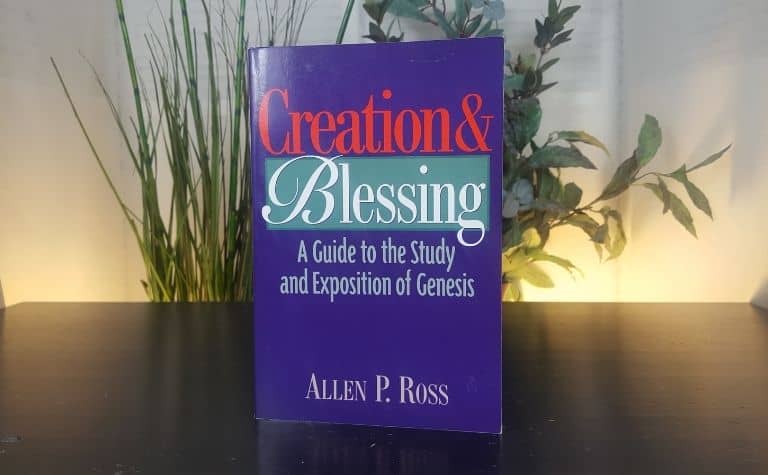
An evangelical commentary that focuses on theology
Ross’s commentary is more comparable to Walton’s than to Wenham, Hamilton, or Mathews. “Creation & Blessing” is more accessible than Walton, and pastors may find it easier to navigate. Both volumes include theological reflection. Ross contains more interpretations consistent with conservative evangelical theology.
If readers are looking for preaching help, they may even prefer Ross because he combines expository and theological insight into his commentary on the text. However, Ross’s book doesn’t have separate sections on applying the text as Walton’s does.
“Creation and Blessing” is a stand-alone commentary, meaning it isn’t part of a series like the first four commentaries on this list. The book is currently available in high-quality paperback format, which brings down the price, especially compared to the top three.
Writing ministry: Ross also wrote “Holiness to the Lord: A Guide to the Exposition of the Book of Leviticus,” which helps readers explore the book’s structure, themes, and applications. Ross used to teach at Dallas Theological Seminary. Presently, he has been a long-time professor at Beeson Divinity School.
#6: Genesis by Derek Kidner (TOTC)
Derek Kidner (1913-2008) was a notable Bible scholar. He served on the faculty of Oak Hill College in London and was associated with the Tyndale House, a research institute in Cambridge. Kidner’s writings are known for their accessible style, combining scholarly research with pastoral sensitivities.
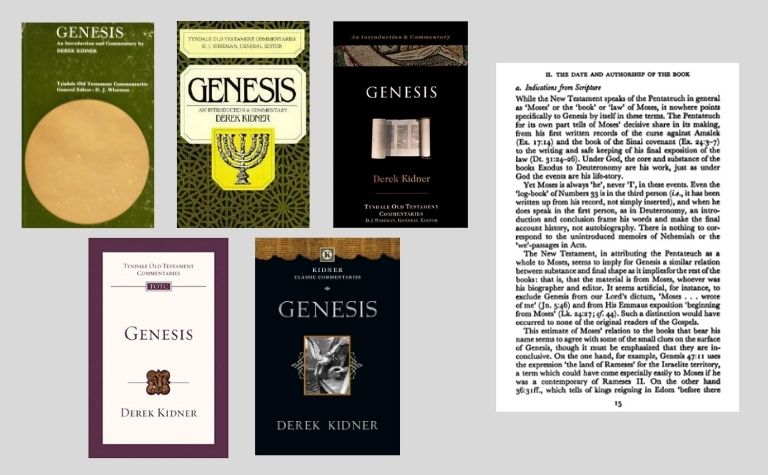
Kinder has a warm, pastoral, devotional writing style
Longman calls this relatively short volume “solidly conservative.” Derek Kidner is a much-beloved commentary writer. Many readers enjoy his commentaries because his explanations are easy to understand, and his pastoral and devotional reflections on the text are memorable.
Comparison: Like Walton and Ross, Kidner doesn’t offer in-depth commentary on every verse of Genesis. At 240 pages, it’s too succinct to compare to Wenham, Hamilton, and Mathews. The more apt comparison is with Walton and Ross, though Kidner’s volume is one-third their length.
Series: Kidner’s Genesis commentary was in the Tyndale Old Testament Commentary series, which is designed to provide accessible and reliable explanations of biblical texts for a range of readers, including pastors, students, and laypeople. Yet, the publisher has replaced it in the series. However, it’s currently available as a stand-alone volume with a black cover (see picture above).
Writing ministry: In addition to Genesis, Kidner’s notable works include commentaries on various books of the Old Testament, such as Psalms, Proverbs, Ecclesiastes, Jeremiah, and Ezekiel. Each volume is highly regarded for its attention to the original Hebrew text, literary analysis, and theological insights.
#7: Genesis: A Commentary by Bruce K. Waltke (Stand Alone)
Bruce K. Waltke is a highly respected Bible scholar and Old Testament theologian. He is known for his extensive research, contributions to biblical studies, and expertise in Hebrew language and literature.
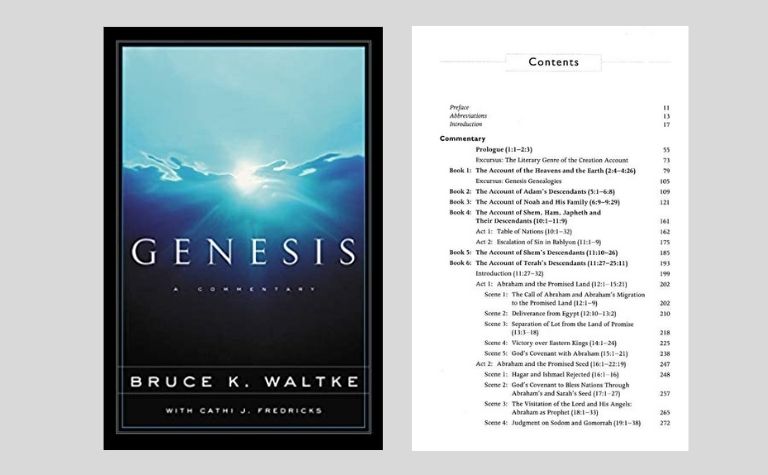
A Genesis commentary for literary analysis and theological reflection
Comparison: Waltke’s commentary has more similarities with Mathews’ than others on this list. While his comments are based on the Hebrew of Genesis, Wenham interacts more with the original language. Additionally, though Waltke’s theological reflections will help readers start to make applications of the text, Walton is more helpful in doing so.
Readers: Waltke’s stand-alone Genesis commentary is designed for various readers, including pastors, scholars, Sunday school teachers, and other Bible readers. However, its exegetical and theological depth may challenge inexperienced commentary readers.
Ministry: Waltke has held teaching positions at various institutions, including Dallas Theological Seminary, Regent College, and Reformed Theological Seminary. He is also a former president of the Evangelical Theological Society. Waltke has been on the NIV translation committee since 1974.
#8: Genesis by James McKeown (TH)
James McKeown is an Irish scholar and theologian specializing in the study of the Old Testament, particularly the book of Joshua. He is known for his expertise in Hebrew language and literature, as well as his contributions to biblical studies and the field of Semitics.
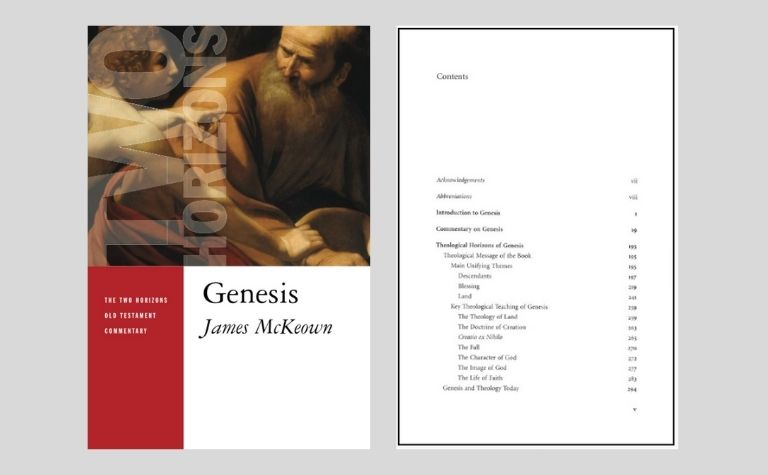
Biblical studies plus systematic theology
Volume: For readers who are looking for a Genesis commentary that offers passage-by-passage explanations of the text that consider moderately liberal theological perspectives, then McKeown’s volume in the Two Horizons series may be the right choice. Conservative reviews have criticized some of McKeown’s views and conclusions.
Series: The “two horizons” are biblical studies and systematic theology. The series aims to provide rigorous biblical scholarship while engaging in theological reflection. The commentary series is no longer printed. The publisher discontinued it before it was complete.
#9: Genesis by John Sailhamer (EBCR)
John Sailhamer (1946-2017) was a prominent biblical scholar and Old Testament theologian. He specialized in the study of the Pentateuch (the first five books of the Bible) and made significant contributions to the field of biblical interpretation.
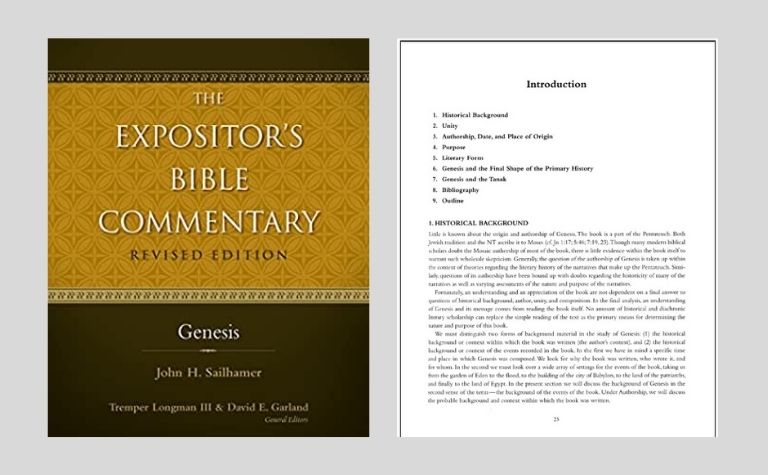
A conservative author contributes to a popular series
Sailhammer’s volume is Desiring God’s #1 recommended commentary on Genesis. It’s well-reviewed for its conservative positions and thoroughness. He provides verse-by-verse explanations.
Volume: Scholars may find Sailhamer’s interaction with Ancient Near East literature helpful, but pastors and other Bible readers probably won’t. However, he also discusses the application of Genesis, which those using the book for ministry or devotional purposes will find helpful.
Author: Sailhamer is best known for his work on the book of Genesis and his approach to understanding the structure and composition of the Pentateuch. He argued for a literary approach to the text, emphasizing the importance of the final form of the biblical books and their theological message.
Series: The Expositor’s Bible Commentary is a multi-volume series that provides in-depth explanations and interpretations of the books of the Bible. The series was initially published in the 1970s, but authors made subsequent revisions and updates to the original volumes from 2007-2010.
#10: Genesis by John E. Hartley (UBCS)
John E. Hartley has written commentaries on several books of the Old Testament, including Job, Genesis, Leviticus, and Isaiah. His commentaries are highly regarded for their careful exegesis, attention to literary and theological themes, and practical application.
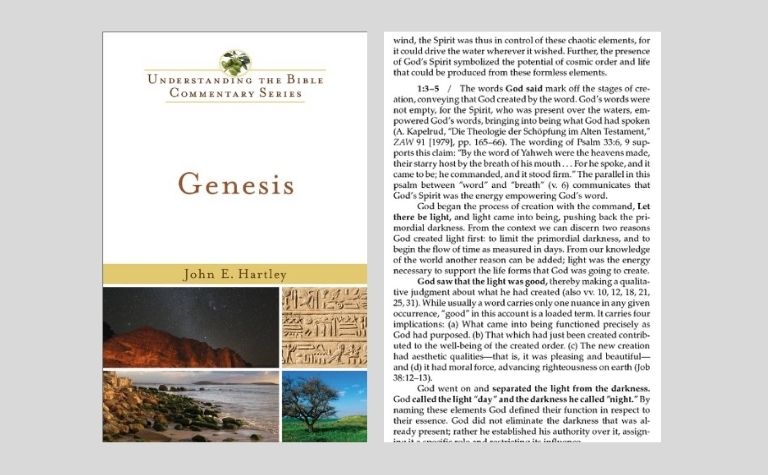
Hartley writes a Genesis introductory commentary for pastors
Volume: John Hartley’s commentary on Genesis is an average-size paperback that contains introductory to mid-level explanations of the text. Pastors may use it because Hartley will help them explain the stories of Genesis. Other Bible readers will like it because it’s useful for devotional and small group purposes.
Series: The Understanding the Bible Commentary Series (UBCS) is a rebranding of the New International Bible Commentary series (NIBC). The rebranded volumes don’t contain new content, i.e., they aren’t updates or revisions. Instead, volumes have new covers because they have a new publisher.
The NIBC series is designed to provide readers with clear and concise explanations of the biblical text and insights into its historical, cultural, and theological context. Volumes include book introductions, verse-by-verse explanations, and reflections on the text’s meaning for today’s readers.
More Commentaries on the Book of Genesis
Why are the Genesis commentaries below not in the “Top 10”? It’s not because they have received poor reviews or people haven’t found them helpful. The reasons vary.
Some are relatively new and haven’t been widely reviewed, read, or used. Others haven’t been broadly distributed, so getting enough information to aggregate is difficult. And others may be outdated in relation to biblical scholarship or out of print and difficult to acquire.
The “Top 10” list is reviewed annually. Readers are encouraged to consider the volumes in this section before purchasing a Genesis commentary. These ten are not in any particular order.
| Title/Series/Author | Check Prices on Amazon |
|---|---|
| Genesis (Interpretation) by Walter Brueggemann | Use exact ISBN |
| Genesis (JPS Torah Commentary) by Nahum M. Sarna | Use exact ISBN |
| Genesis 1-11 (The Bible Speaks Today) by David Atkinson | Use exact ISBN |
| Genesis 12-50 (Bible Speaks Today) by Joyce Baldwin | Use exact ISBN |
| Genesis (Focus on the Bible) by Richard P. Belcher, Jr. | Use exact ISBN |
| Genesis (Brazos Theological Commentary) by R.R. Reno | Use exact ISBN |
| Genesis: A New Commentary (stand-alone) by Meredith G. Kline | Use exact ISBN |
| Title/Series/Author | Check Prices on Amazon |
|---|---|
| Genesis (New Cambridge Bible Commentary) by Bill T. Arnold | Use exact ISBN |
| Genesis (Old Testament Library) by Gerhard Von Rad | Use exact ISBN |
| Genesis (The Anchor Yale Bible Commentaries) by E.A. Speiser | Use exact ISBN |
| Genesis (A Continental Commentary) by Claus Westermann | Use exact ISBN |
| The Genesis Record (stand-alone) by Henry M. Morris | Use exact ISBN |
| Genesis (Crossway Classic Commentary) by John Calvin | Use exact ISBN |
Also see:
References:
[1] Source
[2] Source
[3] Source
Related Questions
Is it time to take your understanding of the Gospel of Matthew to the next level? Learning and absorbing insights about the life and ministry of Jesus Christ from Matthew is worth your time and...
Imagine if you could understand the Book of Revelation better. What if you could make sense of the four horsemen of the apocalypse, the beast that rises out of the sea, and the 1,000-year millennial...
